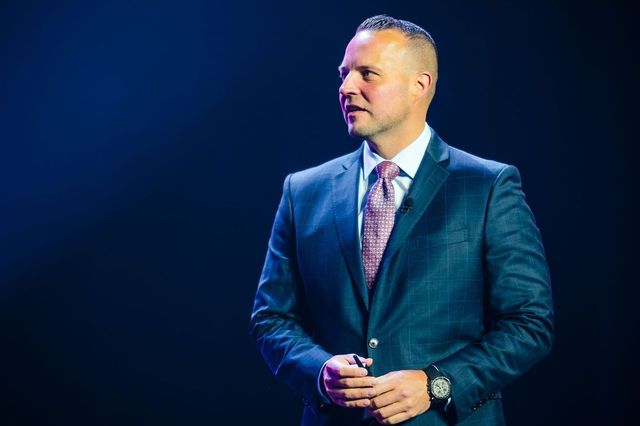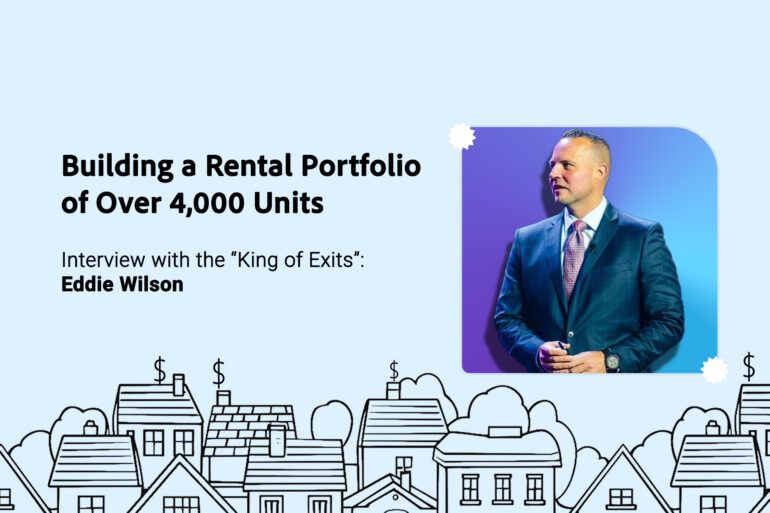Interview with the “King of Exits”: Eddie Wilson
After seeing serial entrepreneur Eddie Wilson speak at a recent Aspire Convention, we reached out to him to get his perspective on real estate investing, leadership, and philanthropy—all areas where he’s thrived over his career.

I would constantly go through the [tax deed investing] process just because it was a lower barrier to entry.
Building a Rental Portfolio of Over 4,000 Units
Wilson has been around real estate and business his whole life. His father and grandfather were both real estate investors, and his parents were both entrepreneurs.
“I grew up around it, so it was a natural path,” Wilson told us. At age 23, he bought his first investment property before even purchasing a primary residence. Now, he’s invested in over 4,000 rental units and has flipped nearly 300 properties.
Over time, he’s moved from investing in single-family to small multifamily to mostly large multifamily assets. Meanwhile, he’s owned and exited over 100 companies, the capital from which he pours into real estate. “That’s how I’ve gotten over 4,000 doors,” he said.
While some of Wilson’s deals are structured as syndications (e.g. he’s currently heavily invested in one that’s building 350 multifamily Class A units), others are parts of funds he manages (e.g. he has one for mobile homes on land, one for multifamily properties, and another general fund).
“For the most part, I’m a buy-and-hold guy,” Wilson said. “I believe in the long-term value of real estate and really exercise the appreciation and tax benefits of real estate.”
Starting With Tax Deed and Foreclosure Properties
That said, Wilson started his real estate investing journey with tax deed and foreclosure properties in Indiana and Illinois.
“I would constantly go through the [tax deed investing] process just because it was a lower barrier to entry,” Wilson said. “I bought a ton of tax deeds and let them season and ended up either foreclosing on them or turning them into performing notes.”
In addition, Wilson flipped nearly 200 foreclosure and tax deed properties from 2010 to 2014. More recently, Wilson does fewer flips and lends to flip investors instead.
“You naturally start off in a very active role in real estate, and then you graduate to a more passive role,” he said. “I’m just in more of a passive role in just about everything I do in real estate anymore.”

Wilson’s Top Picks for Up-and-Coming Housing Markets
When choosing a market to invest in, Wilson has two strategies.
On the one hand, he invests in what he calls “workhorse” markets. These are long-term, tenant-friendly markets with consistent rates of return, such as Ohio, Indiana, and other Rust Belt areas.
On the other hand, Wilson invests in speculative markets where he anticipates population growth. This was the strategy behind Wilson’s successful market timings in Tampa from 2010 to 2013 and later in Cape Coral and Fort Myers, for example.
Today, Wilson is betting on Jacksonville, Florida. “It’s still very underdeveloped from a housing perspective. But from an infrastructure [perspective], it’s overdeveloped,” Wilson explained. “So, you have plenty of options for growth there.”
Furthermore, “on the short-term rental side, you can still find beachfront property in Jacksonville for a third of the price of the rest of Florida.”
Other markets that Wilson is bullish on include San Antonia, Texas; Lubbock, Texas; Dallas-Fort Worth, Texas; and Louisville, Kentucky.
As a leader, I have to not just be good at something. I have to dissect why I’m good at something and be able to teach someone else.
The Three Levels to Becoming an Effective Leader
As a regular speaker and boss to hundreds of employees, Wilson also knows a thing or two about becoming an effective leader.
For him, effective leadership starts with emotional intelligence, i.e. understanding yourself at a high level. “People who are socially or emotionally unaware are not a very good canvas to then add leadership traits to,” Wilson explained.
From there, leaders must develop self-governance, out of which flows productivity that can inspire others. That’s why “people with high levels of self-governance attract the most followers,” Wilson said.
Finally, effective leaders must routinely inspire others toward a common goal. “It’s not about me saying something profound to my employees one time,” Wilson said. “It’s about me saying the same thing in different ways consistently over six months to a year that actually incites change.”
As you follow these leadership principles, you’ll go from leading yourself (level one) to leading followers (level two) to ultimately leading other leaders (level three).
Of course, such leadership requires building replicable processes you can delegate. “There’s a massive difference between someone who’s competent and someone who’s consciously competent,” Wilson said.
“As a leader, I have to not just be good at something. I have to dissect why I’m good at something and be able to teach someone else.”
I believe in making a profit, but I believe in making a profit so that I can turn around and take that profit and create an impact on someone else’s life.

Giving Back and Impacting Others
On top of real estate investing, Wilson gives back through humanitarian work.
“I’ve had a billion-dollar exit in the past,” Wilson explained. “At some point, another car, another house, another vacation doesn’t do much for you. And really, when you pursue those things, you lack fulfillment.”
Consequently, Wilson uses profits from his businesses and real estate to help fund Impact Others, a non-profit that helps underprivileged children across the globe.
Today, the organization feeds and educates over 4,000 children per day, has orphanages in over 16 countries, and helps communities build sustainable businesses.
“All of my businesses, I would call ‘cause-capitalism’ businesses,” Wilson said. “I believe in making a profit, but I believe in making a profit so that I can turn around and take that profit and create an impact on someone else’s life.”
Wilson’s Top Advice for First-Time Real Estate Investors
When asked for his advice to beginner real estate investors, Wilson said, “I rarely give the advice of doing something with a partner, but I think in real estate, it’s very applicable,” Wilson said. “Limit your liability by adding knowledge to the equation.”
Furthermore, if you have limited capital, partner with someone who can bring money to the table. This could be another investor you meet at a local networking event or online. Alternatively, it could be a private lender, “somebody that’s willing to look at the asset and lend on the asset, not your bankability,” Wilson said.
“When you both have something to gain and something to lose by the asset itself, it aligns you with that partnership.”
In addition, Wilson recommended investing in something that’s hard to lose. “I love the model of foreclosures and tax deeds because it has a lot less liability than a lot of other real estate ventures,” he said.
Finally, invest as early as you can to maximize the appreciation benefits. “My greatest assets that I still have today are the ones that I bought 20 years ago,” Wilson said.








